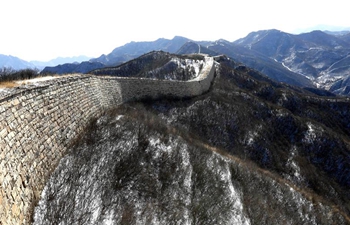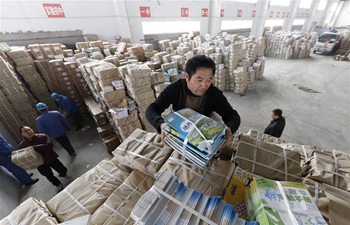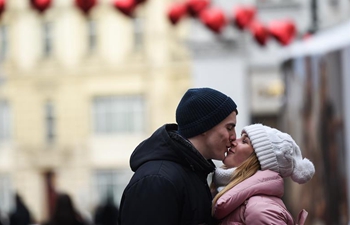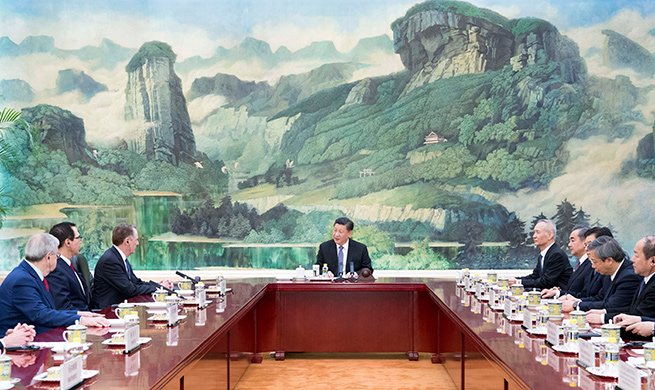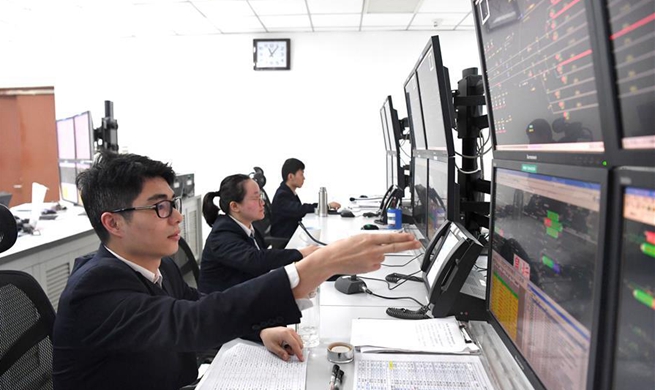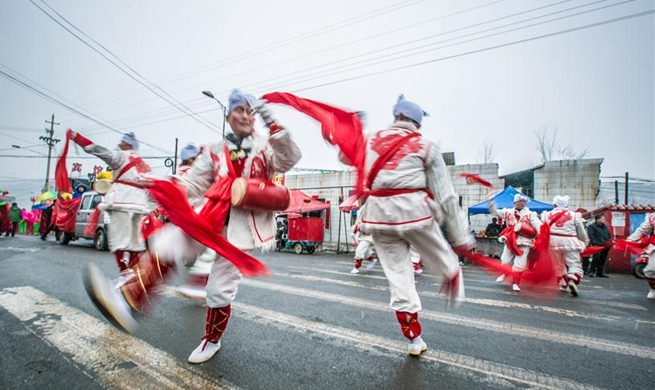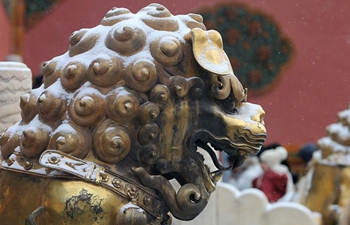by Xinhua writers Xu Feng, Chang Yuan and Gao Shan
NEW YORK, Feb. 15 (Xinhua) -- "Without music, life would be a mistake." This accessible piece of insight from Friedrich Nietzsche must have eluded no one, as artists are using a plethora of music to ensure the Chinese New Year celebrations in the United States are done properly.
From Peking opera's stylized singing to Frank Sinatra's evocative tunes, from music maestro Tan Dun to dashing young composer Du Yun, from western instrument violin to traditional Chinese zither, melodies of classics and modern favorites are speaking directly to the ears and hearts of audiences in settings as diverse as the solemn Kennedy Center in Washington, D.C. and a bustling transportation hub in New York City.
The Chinese New Year, or Spring Festival, fell on Feb. 5 this year, but merrymaking on both sides of the Pacific has been extensive, beginning about one week in advance and lasting until the Lantern Festival on the 15th day of the new year.
MUSIC KNOWS NO BOUNDARY
For two countries that speak languages as disparate as English and Mandarin, music, as a universal language, easily comes to its own in bridging communications.
The New York Philharmonic presented its eighth edition of Lunar New Year concert at Lincoln Center in New York on Feb. 6, featuring the U.S. premiere of Oscar-winning Chinese composer Tan Dun's violin concerto Fire Ritual.
Fire Ritual is deeply influenced by worship music and court music in ancient China, while blending western and modern musical elements. Hand cymbals, resembling those in Peking opera, were seamlessly merged with a Baroque violin ensemble.
Having celebrated the Lunar New Year for eight years, the New York Philharmonic intends to "continue it pretty much indefinitely" because both locals and Chinese people here love it, Bill Thomas, executive director of the orchestra, told Xinhua.
"Music is a universal language. We always hope what we do will help a broad world community, including the relationship between our two nations," he said. The orchestra now travels regularly to Shanghai in summer thanks to the growing population of classical music aficionados in the trendy metropolis.
A mini concert featuring the collaboration of two traditional Chinese string instruments of guqin and guzheng (both from the zither family) was held Saturday in the Metropolitan Museum of Art in New York City as part of a whole-day celebration of the Chinese New Year.
Two master performers from China sat side-by-side playing Chinese musical classics such as "A Night of Flowers and Moonlight by the Spring River" and "Invisible Mountain," adding a vibe of tranquility to the crowded museum.
"This is just beautiful," a spectator who identified himself only as Carlos told Xinhua. "I've never heard something like this before."
Music flowed to unexpected place as well. On Feb. 8, a free one-hour symphony concert was staged in the Oculus, the new transit hub of the World Trade Center, holding hundreds of busy commuters spellbound.
Popular Western songs such as Frank Sinatra's "New York, New York" and a number of famous Chinese music pieces such as "Jasmine Flower," "Ode to the Yangtze River," were performed by the Asian Cultural Symphony, a local ensemble of nearly 100 artists of various ethnic groups and backgrounds.
EAST MEETS WEST
In the Disney Hall in downtown Los Angeles, Los Angeles Philharmonic staged two concerts on the nights of Feb. 6-7. They centered around rousing and melodic Chinese and Western classics, such as Li Huanzhi's "The Spring Festival Overture," Camille Saint-Saens' "Introduction and Rondo Capriccioso," and the world premiere of an ambitious new piece by Shanghai-born, Pulitzer Prize-winning composer, Du Yun.
Du's performance marked the first time in history that Xinchang Diaoqiang opera, a type of traditional Chinese opera that originated from Zhejiang Province, has been heard by an international audience.
She takes inspiration from Xinchang Diaoqiang opera, an ancient and regional form of Chinese opera, and aims to reimagine the future of Chinese opera in a contemporary context.
"I want to showcase the diversity of Chinese culture to the world through music," Du, also 2019 Grammy Awards nominee, told Xinhua.
"It's such a pleasure to see another side to music, from a culture from the other side of the world," said a local resident, whose given name is Silvie.
"I've always wanted to see a Chinese New Year celebration, and when these tickets became available, I just couldn't miss it," said Louisa, a Cuban matriarch.
Megan Martineau, artistic administrator of the LA Phil, told Xinhua, "The Chinese New Year program was a big priority for us. U.S. audiences are very open to learning about the culture of China and engaging in the celebration of the Lunar New Year as well.
The Hubei Chime Bells National Chinese Orchestra and the China National Peking Opera Company put on performances at the audience-packed Chicago Symphony Center Sunday, featuring traditional chime bells, music and well recognized opera pieces.
"Our annual Chinese New Year Celebration concert has become a highly anticipated tradition at the Symphony Center," said Jeff Alexander, president of Chicago Symphony Orchestra Association.
Alexander said that the Chicago Symphony Orchestra (CSO) has just finished a well-received performance tour in Shanghai and Beijing, and this year marked the fifth annual Chinese New Year concert presented by CSO.
"The costume is beautiful, and the music powerful," said Beth Schenker, a Chicago resident.
At the Kennedy Center in Washington, D.C., a Chinese concert revisiting Monk Xuanzang's pilgrimage was warmly received during its U.S. premiere in late January.
The massive suite, performed by China National Traditional Orchestra, tells the story of Xuangzang, a Chinese Buddhist monk in the 7th century who traveled a wide swath of the Silk Road in a 17-year journey to retrieve Buddhist scriptures.
The story was presented with a rich variety of Chinese and exotic instruments. Powerful storytelling and a stunning multimedia experience helped bring the audience into Monk Xuanzang's journey, reviving his resolve, sacrifice, and perseverance.
"It's an education, really striking," said federal employee and local resident Matt Aubuchon.
(Xinhua reporters Xu Jing in Chicago, Xu Jianmei and Xiong Maoling in Washington, D.C., Julia Pierrepont III in Los Angeles contributed to the story)
